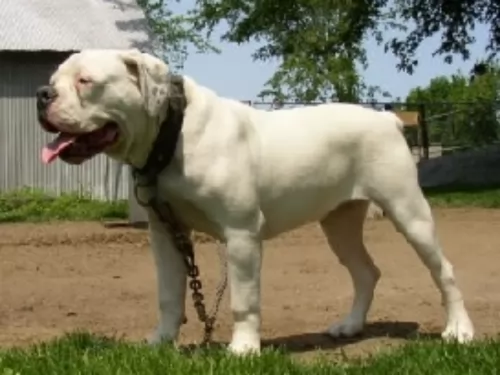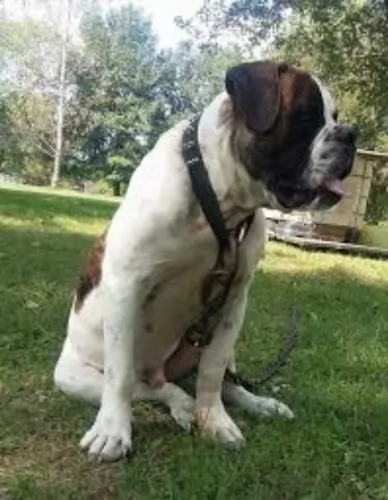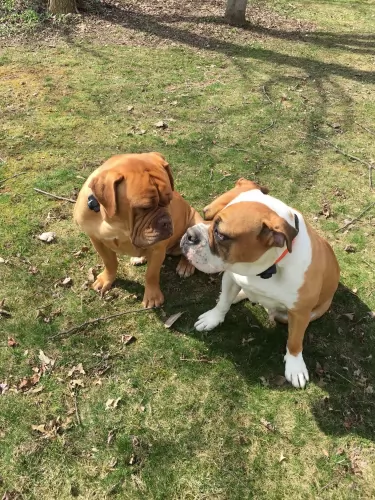 Petzlover
PetzloverEnglish White Terrier is originated from United Kingdom but Hermes Bulldogge is originated from United States. English White Terrier may grow 17 cm / 6 inches shorter than Hermes Bulldogge. English White Terrier may weigh 59 kg / 130 pounds lesser than Hermes Bulldogge. English White Terrier may live 7 years less than Hermes Bulldogge. Both English White Terrier and Hermes Bulldogge has almost same litter size. English White Terrier requires Moderate Maintenance. But Hermes Bulldogge requires Low Maintenance
The English White Terrier was developed in the 1860’s by a group of breeders from the Sealyham terriers, the Jack Russell terrier, and the Fox Terrier. These breeders were looking for a white terrier that could be more successful in the show ring than the current prick-eared English terrier. They named their new breed, the English White Terrier or the Old English terrier. In later years in the United States, the English White Terrier was mixed again with the Rat Terrier and the Old English Bulldog to create both the Boston terrier and the Bull terrier.
Although the breed did not last long it did have a prestigious ancestry that could be traced back centuries in England among ancient terriers. The word terrier was in use in England in 1440, showing that the dogs were well known at that time. Most historians agree that the dogs were even older than the 1400’s. It is believed that terriers who “went to ground” after prey, existed as far back as the time of Christ in England.
Most of these ancestors of the English White Terrier were not white. White terriers came onto the scene around the 1700’s.The first picture of white terriers appeared in 1790 when Sawre Gilpin, a British artist, painted “A Huntsman with Hounds Foxhunting” and the terriers in the painting were white with brown marks. Others began to show the same kind of terriers in their artwork – white coated. Before this it is believed that breeders killed the white terriers at birth because they were often deaf and inferior to the other terriers. In the early part of the 19th century, the white terrier began to be completely white with no markings. The Kennel Club recognized them in 1874 as the White English Terrier.
The breed faced many genetic issues, deafness and the Kennel Clubs felt there was no difference between the current White English terrier and the English White terrier despite the difference in their ears. The new English White Terrier had dropped ears instead of Prick-ears. They considered them to be the same breed and not even different types. They were the smallest of all terriers and considered to be a good pet but not a show dog or a working dog. Because of this it was not very popular, and it actually had been bred to be a show dog and not a working dog. The English White Terrier was not recognized by any Kennel Club and within 30 years it was extinct.
 The Hermes Bulldogge is not a breed in itself, but is actually a line within the English Bulldogge line. The Hermes family in the United States bred this line for several years. The Hermes Bulldogge line is the largest of the re-creations from the English Bulldogge. They are inspired by the arena dogs from the days of the Roman Empire. Greg and Linda Hermes have bred healthy, smart, resilient and agile dogs. The desire of the Hermes was an attempt at recreating the 17th century dog.
The Hermes Bulldogge is not a breed in itself, but is actually a line within the English Bulldogge line. The Hermes family in the United States bred this line for several years. The Hermes Bulldogge line is the largest of the re-creations from the English Bulldogge. They are inspired by the arena dogs from the days of the Roman Empire. Greg and Linda Hermes have bred healthy, smart, resilient and agile dogs. The desire of the Hermes was an attempt at recreating the 17th century dog.
They used a variety of breeds to create the Hermes Bulldogge, most of whom are never disclosed. Some of the dogs that were probably used include: English Mastiffs, American Bulldogs, Old English Bulldogges, and pit Bull Terriers. This family of dogs are playful, friendly, and good family dogs. They have a strong prey drive which makes them good hunters but not as good around other small animals or small children. The Hermes have been breeding the Hermes Bulldogge since since 1983. The puppies are all hand raised, child friendly with great health.
When discussing the Hermes Bulldogge, one must go back to the root of the English Bulldogge. That breed comes originally from England and various lines have been recreated by various breeders. The breeding of the Old English Bulldogge with Mastiffs and Pits lead to other lines that the breeders called Old English. But most fanciers believe that only two lines of the original Old English Bulldogge remain and that is the Leavitt and the Hermes.
Some form of bulldog has been in existence since 700 years ago and as it was mixed with a variety of other breeds it took on other forms over time. The English Bulldogge was a definite couch potato. Instead of being bred for a job or look, the Bulldogge was developed with temperament, ability and health in mind. This has made for a great family dog without a lot of veterinarian bills.
The English White Terrier had a pure white coat with no markings of any kind. His coat was short, hard, and glossy and his body was firm, muscular and hard. The breed was small – almost a toy. They had a body like the Manchester Terrier. They had long legs and large feet. The tail was medium size and straight out from the body.
The English White Terrier had a very refined head with a fairly long muzzle. Their bite was even, and their eyes were brown, amber or black. Their ears dropped – unlike the pricked ears of the White English Terrier.
 The Hermes Bulldogge, much like the original Olde English Bulldogge, is taller, healthier, more athletic than the original English Bulldog. They are medium height, with a large head, a strong body and a deep, wide chest and broad shoulders. Tails might or might not be docked but the ears are never docked. They n have a moderate amount of wrinkles and a longer, less smashed face than the original. It is easier for the Hermes Bulldogge to breath, to fly and to live in warmer environments that it is for the English Bulldogge. His eyes are lower in his head but in the front center.
The Hermes Bulldogge, much like the original Olde English Bulldogge, is taller, healthier, more athletic than the original English Bulldog. They are medium height, with a large head, a strong body and a deep, wide chest and broad shoulders. Tails might or might not be docked but the ears are never docked. They n have a moderate amount of wrinkles and a longer, less smashed face than the original. It is easier for the Hermes Bulldogge to breath, to fly and to live in warmer environments that it is for the English Bulldogge. His eyes are lower in his head but in the front center.
They are very dark almost black. Eyelids should cover the white of the eye and they have rounded cheeks. They have a short muzzle and short face. Broad, thick lips finish out the face with very large, square, broad jaws.
The English White Terrier was affectionate and devoted to his family. It was the softest tempered of all terriers and made an excellent pet. Some of the English White Terriers were animal aggressive while others were not. Training was difficult because of the wide-spread deafness in the breed. IT loved to be cuddled and held. They were also tenacious and game for any type of fight or hunt despite their size and deficiencies.
 If socialized properly this line of bulldog is harmful to me.
If socialized properly this line of bulldog is harmful to me.
Strong and athletic, his strength and stamina.
He is not very adaptable. Apartments are not good for this dog. He needs to run and if possible to hunt.
He is very intelligent but stubborn which affects his learning ability.
The breed was considered to be unhealthy for the most part and became extinct because of this. Many complained that the breed was inbred and had a weak constitution because of it. Deafness was prevalent throughout the breed. This deafness occurs in many white animals, but the English White Terrier had the highest rates among all white dogs.
 The Hermes Bulldogge is healthier than most bulldogs. His face is not as smashed and he is not as wrinkled. He can breathe easier than other Bulldogs. The two major concerns are hip dysplasia and bloat.
The Hermes Bulldogge is healthier than most bulldogs. His face is not as smashed and he is not as wrinkled. He can breathe easier than other Bulldogs. The two major concerns are hip dysplasia and bloat.
Hip Dysplasia also some elbow dysplasia: can cause lameness and arthritis
Terminal unless treated immediately. Can be prevented by not feeding large meals before or after heavy exercise.
It was best to feed the English White Terrier 1-2 cups of dry meal per day served in 2 meals.
As mention previously, the English White Terrier was congenitally deaf and had a weak constitution.
This little dog with all its problems was still a very energetic dog and needed considerable exercise. Owners had to develop exercises and games to keep the English White Terrier occupied as with any terrier. If they didn’t have a job or something to occupy their minds and bodies, they were destructive.
 When feeding a Hermes Bulldogge puppy be sure you feed puppy meal for bulldogs or medium dogs. For first year fee 2-4 times a day 2 cups food.
When feeding a Hermes Bulldogge puppy be sure you feed puppy meal for bulldogs or medium dogs. For first year fee 2-4 times a day 2 cups food.
Feed the adult a solid adult dry food. 2 cups twice a day.
Better health than most lines of Bulldogs. Few wrinkles and less problems breathing as he doesn’t have a smashed face.
He doesn’t need a lot of exercise but daily walks and lots of play time. He can enjoy Lure Coursing obedience, agility and obedience